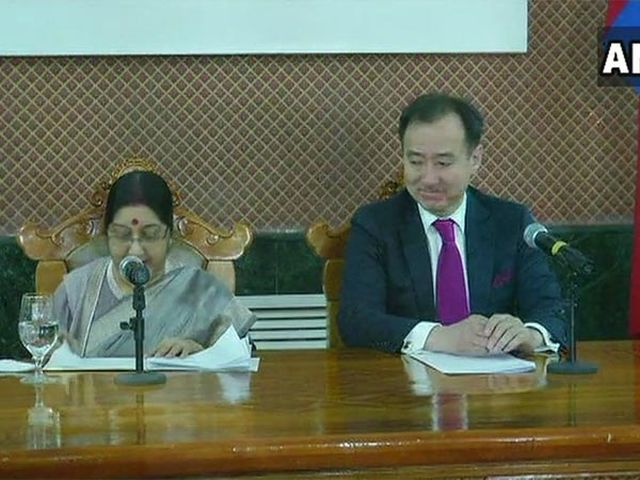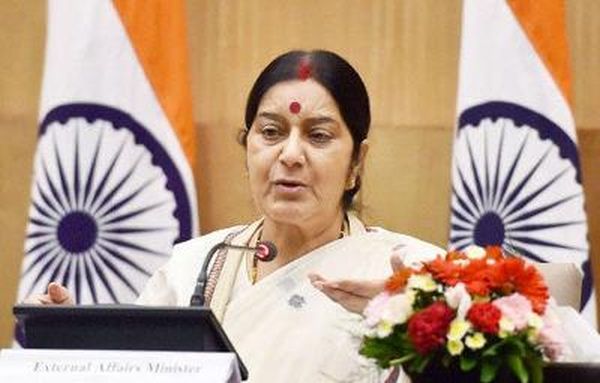
by Editor | May 25, 2021 | Business, Emerging Businesses, News, Politics
 Ulaanbaatar : External Affairs Minister Sushma Swaraj on Wednesday discussed terrorism with her Mongolian counterpart Damdin Tsogtbaatar and the two agreed to collaborate to confront those who design and support terror outfits.
Ulaanbaatar : External Affairs Minister Sushma Swaraj on Wednesday discussed terrorism with her Mongolian counterpart Damdin Tsogtbaatar and the two agreed to collaborate to confront those who design and support terror outfits.
Sushma Swaraj, who arrived in the Mongolian capital here on Tuesday after wrapping up her China visit, also called upon the country’s business community to seize economic opportunities from India’s growth.
She is here to co-chair the sixth round of the India-Mongolia Joint Consultative Committee (IMJCC), focusing on a range of issues including economic, energy, political, strategic, educational and cultural ties.
She is the first Indian Foreign Minister to visit Mongolia in 42 years.
In 2015, Narendra Modi was the first Indian Prime Minister to visit this landlocked Asian country. It had ruffled China’s feathers.
Addressing a press conference here after holding talks with Tsogtbaatar, Sushma Swaraj said: “We discussed global challenges affecting humanity, particularly terrorism, and agreed to collaborate bilaterally in the international arena to root out this evil.
She said India sees Mongolia as a factor of stability in East Asia, adding that the country’s social and economic development is the key to peace and prosperity in the region.
India is currently helping Mongolia build its first oil refinery with a $1 billion line of credit, to reduce its dependence of neighbouring nations.
Sushma Swaraj said that she had reviewed the oil refinery project and other ongoing projects.
“India has emerged as the fastest growing economy in the world. With its rich natural resources and strong aspiration for development, Mongolia can be an important partner in India’s growth story,” she said.
She said both the nations have identified new areas of cooperation that include IT, infrastructure, energy and services.
Both the countries agreed to remove institutional and logistical obstructions to boost trade and tourism.
She also announced new scholarships for Mongolian students visiting India and enrolling in fields like Buddhist studies.
—IANS

by Editor | May 25, 2021 | News, Politics
 New Delhi : Thirty-nine Indians kidnapped by the Islamic State (IS) terror group in Iraq’s Mosul in 2014 are dead, External Affairs Minister Sushma Swaraj said on Tuesday.
New Delhi : Thirty-nine Indians kidnapped by the Islamic State (IS) terror group in Iraq’s Mosul in 2014 are dead, External Affairs Minister Sushma Swaraj said on Tuesday.
The minister confirmed the deaths in the Rajya Sabha and said the mortal remains will be brought back to India by Union Minister of State for External Affairs V.K. Singh.
“General V.K. Singh will go to Iraq to bring back the mortal remains of the Indians killed in Iraq. The plane carrying the mortal remains will first reach Amritsar, then Patna and then go to Kolkata,” Sushma Swaraj said.
She said the bodies were spotted using deep penetration radar and were exhumed from mass graves.
Their identities were confirmed by DNA tests.
“The bodies were brought to Baghdad for DNA testing. The DNA of 38 Indians have been matched.
“For verification of the bodies, DNA samples of their relatives were sent there. Four state governments — Punjab, Himachal Pradesh, West Bengal and Bihar — were involved in the process,” the minister said.
The victims — 31 from Punjab, four from Himachal Pradesh and four from Bihar and West Bengal — were construction workers and were employed by an Iraqi company in Mosul.
They were taken hostage when the IS took control of Mosul, the second largest city in Iraq. The workers were trying to leave Mosul when they were taken hostage.
Sushma Swaraj also dismissed claims of Harjeet Massi, one of them who escaped from Mosul.
“He was not willing to tell me how he escaped,” she said.
The minister said that she had concrete evidence that he was lying.
Massi had escaped along with Bangladeshis with the help of a caterer with a fake name ‘Ali’, she said.
She said the details were revealed to her by Massi’s employer and the caterer who helped him.
In July 2017, Sushma Swaraj had said that she would not declare the 39 Indians dead without concrete proof or evidence.
—IANS

by Editor | May 25, 2021 | Muslim World
 Riyadh : Indian External Affairs Minister Sushma Swaraj on Wednesday thanked Saudi Arabia for increasing India’s quota for Islam’s most holy pilgrimage, the Haj.
Riyadh : Indian External Affairs Minister Sushma Swaraj on Wednesday thanked Saudi Arabia for increasing India’s quota for Islam’s most holy pilgrimage, the Haj.
At the inaugural ceremony of the Saudi national and cultural festival Al Janadriyah, where India has been given guest of honour country status this year, Sushma Swaraj said “a large number of my Muslim brothers and sisters from India visit Saudi Arabia every year for Haj and Umrah pilgrimage.
“Once again I thank Your Majesty for increasing the Haj quota for India in 2017 and also for the special arrangements and care given to the pilgrims,” she said.
Last month, Saudi Arabia increased the quota of Indians for the Haj pilgrimage by 5,000 from this year.
The decision by Riyadh came after Union Minority Affairs Minister Mukhtar Abbas Naqvi signed a bilateral annual agreement for Haj 2018 with Saudi Minister for Haj and Umrah Mohammad Saleh bin Taher Benten.
Now, a total of 1.75 lakh Indian citizens can go for Haj. Last year, Saudi Arabia increased India’s Haj quota by 35,000.
Sushma Swaraj said that India’s participation at the Al Janadriyah Festival “provided an opportunity to showcase our strong bilateral relationship”.
The visiting Indian minister received the festival’s patron Saudi King Salman Bin Abdulaziz Al Saud at the India Pavilion showcasing the traditional and modern aspects of India.
“The Pavilion with the theme ‘Saudi ka dost Bharat’ is a big draw at Janadriyah,” External Affairs Ministry spokesperson Rveesh Kumar tweeted.
Earlier on Wednesday, Sushma Swaraj called on King Salman here and “steps to further intensify our strategic partnership in all sectors and to work together towards each other’s progress came up during (the) warm discussion,” according to Kumar.
Prior to that, Sushma Swaraj met her Saudi counterpart Adel Jubeir and discussed deepening of bilateral ties.
According to Kumar, the discussions between Sushma Swaraj and Jubeir focused on enhancing trade and investment, energy, defence and security, culture and people-to-people ties.
“The two Foreign Ministers also discussed the regional and global situation,” the spokesperson said.
The India-Saudi Arabia relationship was elevated to that of a Strategic Partnership during the visit of then Prime Minister Manmohan Singh to the Gulf kingdom in 2010.
Saudi Arabia is the fourth-largest trading partner for India with bilateral trade exceeding $25 billion in 2016-17.
As India’s largest supplier of crude oil, Saudi Arabia accounts for about 20 per cent of the total annual imports.
The Gulf nation is also home to around 3.2 million expatriate Indians, that includes a growing number of professionals, including doctors, software engineers and oil technologists.
Sushma Swaraj arrived here on Tuesday on a three-day visit in what is her first official visit to this Gulf kingdom.
—IANS

by Editor | May 25, 2021 | Corporate, Corporate Governance

External Affairs Minister Sushma Swaraj being welcomed by her Bangladeshi counterpart AH Mahmood Ali on her arrival.
Dhaka : Indian External Affairs Minister Sushma Swaraj has promised to sincerely remove “irritants” between Bangladesh and India.
Sushma Swaraj said relations between the neighbours are now outstanding, and that both countries are working to resolve these irritants in the spirit of “friendly relations and with right intention”, bdnews24 reported.
She did not specify the nature of the issues, but the water sharing of common rivers, particularly the Teesta, has long been pending between the neighbours.
“I can assure you we [both countries] will solve all irritants with sincerity [Imandari ke saath],” she said, speaking in Hindi at India’s new chancery complex in Baridhara before leaving Dhaka.
She said Bangladesh comes first among all of India’s neighbours as part of the neighbourhood policy adopted by her government. She also referred to the peaceful resolution of the land boundary as well as maritime boundary issues.
Sushma Swaraj came to Dhaka to attend the fourth joint commission meeting with her Bangladeshi counterpart A.H. Mahmood Ali.
She inaugurated 15 India-funded development projects during her visit to Bangladesh.
She also formally inaugurated the chancery complex.
Foreign Minister Mahmood Ali, Health Minister Mohammed Nasim, Environment and Forests Minister Anwar Hossain Manju, Prime Minister’s Political Affairs Adviser H.T. Imam, Indian Foreign Secretary S. Jaishankar, Bangladesh Foreign Secretary Md Shahidul Haque and Indian High Commissioner in Dhaka Harsh Vardhan Shringla were present on the occasion.
Sushma left Dhaka around 1.30 p.m. and was seen off by Bangladesh Foreign Secretary Shahidul Haque.
The projects in Bangladesh are funded by India at a cost of Tk 71.64 crore, the Daily Star reported.
According to bdnews24.com, the projects cover sectors such as education, healthcare, IT, water supply and social welfare.
Eleven water treatment plants are being built in southern Bhandaria Upazila in Pirojpur that will provide desalinated potable drinking water to 150,000 citizens. Some 36 community clinics will also be built.
Those projects also include reconstruction of the Ramna Kali Temple which was destroyed by the invading Pakistani forces in 1971.
The project includes construction of the main temple, a five-storey guesthouse, a deep tube-well in the temple premises and the construction of the main entry gate of the temple.
—IANS

by Editor | May 25, 2021 | News, Politics

Sushma Swaraj
By Arul Louis,
United Nations : The eight members of the Shanghai Cooperation Organisation (SCO) should strengthen coordination against terrorism and build it into its framework, India’s External Affairs Minister Sushma Swaraj said here.
Speaking at the ministerial meeting of the SCO on Wednesday, the minister strongly condemned terrorism and said an anti-terrorism structure should be a part of the organisation of which Pakistan is a member.
She said that discussions should continue on a business security architecture for the organisation.
On the sidelines of the meeting, Sushma Swaraj also met China’s Foreign Minister Wang Yi.
India joined the organisation last June. Its other members are Kazakhstan, Kyrgyzstan, Tajikistan, Uzbekistan, China, Russia and Pakistan.
India would cooperate extensively in developing the SCO as an effective regional platform, and connectivity among the members is a priority for New Delhi but it must built with respect for sovereignty, she said.
“We want connectivity to pave the way for cooperation and trust between our societies.”
In this context, she mentioned three transportation projects that are relevant to the connectivity goals even though some of it are out of the SCO – the North-South Transport Corridor, the Chabahar Agreement and the Ashgabat Agreement.
The Chabahar Agreement between India, Afghanistan and Iran allows Indian goods to reach Kabul through Tehran. The trilateral transit could extend to Kazakhstan through Turkmenistan.
The Ashgabat Agreement, which India is in the process of joining, is for a transport corridor linking Oman, Iran, Turkmenistan, Uzbekistan, Kazakhstan and Pakistan.
This corridor is to synchronise the North-South corridor to provide a link from India to Europe.
(Arul Louis can be reached at arul.l@ians.in)
—IANS

 Ulaanbaatar : External Affairs Minister Sushma Swaraj on Wednesday discussed terrorism with her Mongolian counterpart Damdin Tsogtbaatar and the two agreed to collaborate to confront those who design and support terror outfits.
Ulaanbaatar : External Affairs Minister Sushma Swaraj on Wednesday discussed terrorism with her Mongolian counterpart Damdin Tsogtbaatar and the two agreed to collaborate to confront those who design and support terror outfits.

